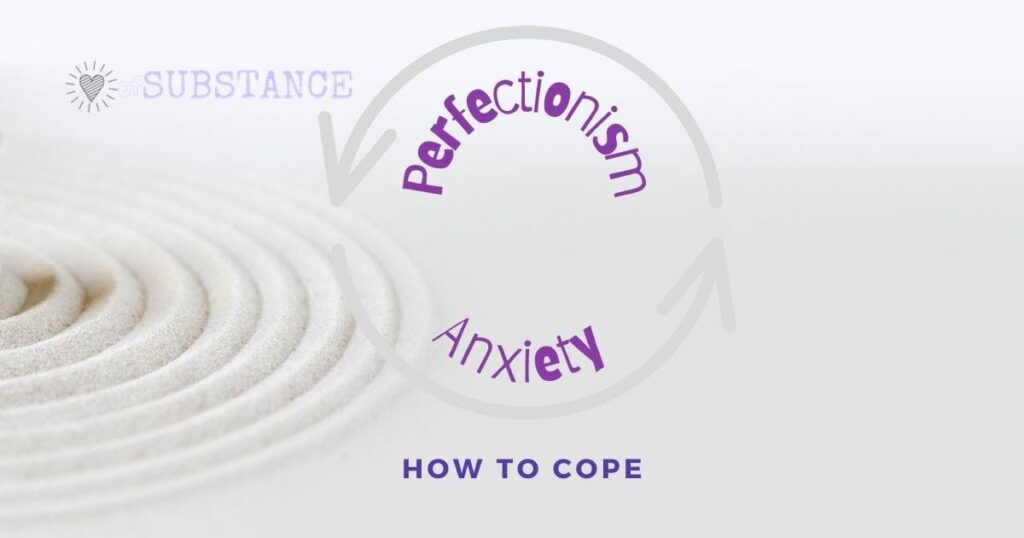Perfectionism and anxiety often go hand in hand to create a vicious cycle that can be difficult to break free from.

In a society that values flawlessness and achievement, it’s easy to fall into the trap of believing that anything less than perfect is unacceptable.
Perfectionism is not all bad. Some perfectionists have contributed enormously to music, art, technology, and sport.
It’s the anxiety that associates with perfectionism at times and can be a huge downside.
Here are some indications of anxiety when striving to look or act perfect:
- Constantly checking and comparing ourselves to others on social media
- Feeling pressure to maintain a certain weight or body shape
- Feeling like we have to dress a certain way to fit in or be accepted
- Trying to maintain a perfect image to impress others or avoid criticism
- Feeling like we have to be productive all the time and not allow ourselves to rest
- Trying to avoid making mistakes or being seen as imperfect
- Feeling inadequate because we feel we have to always have the right answer or know everything
This mindset can lead us to constant self-criticism, fear of failure, and an overall feeling of inadequacy that can fuel anxiety.
Self-doubt, which fuels self-criticism, fear of failure, and a ‘not good enough’ mindset, is oft the basis. This free download: 8-steps to overcome self doubt (free download – pdf) contains proven strategies to help banish this destructive state. Check it out!
In turn, anxiety can increase this pressure to be perfect, perpetuating the cycle.
Understanding the connection between perfectionism and anxiety is crucial in learning how to break free from this harmful pattern of thinking. There are several books on perfectionism.
In researching the signs of a perfectionist and how these interconnect with life struggles…Here’s what I’ve discovered…
How perfectionism contributes to anxiety
- Perfectionism sets unrealistic standards. These are difficult, if not impossible, to achieve.
- The fear of making mistakes or falling short of these standards can be overwhelming and lead to constant worry and stress.
- Perfectionism can cause you to focus excessively on minor details, leading to procrastination or paralysis in deciding upon options going forward.
- The need for control and order can create rigid thinking patterns that make it difficult to adapt to change or the unexpected situations that do arise.
- Perfectionism can lead to a negative self-image and self-criticism, which can then contribute to low self-esteem and depression leading to anxiety.
- The pressure to be perfect can strain relationships and social interactions, as well as interfere with work or academic performance and this leads to anxiety in those areas.
How Anxiety reinforces perfectionism
- Anxiety can mean you’ll to feel a heightened sense of pressure and fear of failure.
- This pressure can lead to a desire for control and certainty, which can manifest as perfectionism.
- Perfectionism can provide a sense of temporary relief from anxiety, as achieving high standards can create a sense of accomplishment and validation.
- However, this relief is short-lived as perfectionism perpetuates the cycle of anxiety by setting even higher expectations and increasing the fear of failure.
- Perfectionism can also lead to avoidance behavior, as individuals may avoid tasks or situations that they fear they cannot achieve perfectly, further reinforcing anxiety and limiting personal growth.
What can I do about my anxiety that comes from being a perfectionist
Here are my 5 tips for overcoming anxiety related with perfectionism:
- Recognize that perfection is unattainable.
It’s okay to make mistakes. Embrace your imperfections.
I’ve come to accept that making mistakes is a natural part of learning.
Plus, it’s okay to not have all the answers.
I can approach challenges with a growth mindset — be more open to trying new things and taking risks. - Break tasks into smaller, more manageable steps.
When I feel overwhelmed with a task, I find it helpful to break it down into smaller, more manageable steps.
I then focus on one task at a time, which reduces my anxiety and helps me avoid getting stuck in procrastination in the cycle of perfectionism.
I start by brainstorming all the steps I need to do to complete the task, no matter how small or insignificant.
Then, I prioritize them and create a schedule or timeline to work on each step.
As I complete each step, I check it off my list, which helps me feel a sense of reward. By breaking tasks down into smaller steps, I’m able to focus on progress rather than perfection. - Practice self-compassion and be kind to yourself.
This is what works for me:
I prioritize self-care activities such as exercise, meditation, and spending time with loved ones.
I remind myself that I’m human and that making mistakes is a natural part of the learning process.
I also try to reframe negative self-talk into positive affirmations and give myself credit for my accomplishments, no matter how small.
See more ways below. - Challenge negative self-talk and replace it with positive affirmations.
Negative self-talk is often driven by fear of failure. CHECK OUT MY OVERCOMING SELF DOUBT IN EIGHT STEPS (FREE DOWNLOAD – no strings attached) - Seek support from friends, family, or a mental health professional if needed.
Simply spending time with family and friends can help get a new perspective on things.
There’s the old saying: a problem shared is a problem halved.
4 Ways to help manage that anxiety that reinforces perfectionism
What can help you make the most of perfectionism while controling the anxiety…
- Calm.
Ways that calm your senses will help you overcome the anxious, stressed-out feelings that can go with perfectionism.
As soon as you feel a pit in your stomach, a lump in your throat or tightness in your shoulders, neck, or jaw it’s time to loosen up with some calm. - Gratitude Journal.
Keep a gratitude journal and write three things each day that you are grateful for.
Reflect on this when needed. This will switch your mindset from one of ‘not good enough’ to a focus of enough – the definition of gratitude. - Music.
Soothing music will help you boost your concentration, get you into the flow (see benefits of alpha state of mind), and drown out that critical inner voice.
- Developing Intuition.
Get to “know” when something is “good enough” and avoid getting bogged down in unnecessary details.
By developing intuition, you learn to trust your inner voice and will make decisions with more confidence, rather than constantly second-guessing yourselves in that cycle of perfectionism.
Info sources on the Perfectionism–Anxiety Link
Antony, M. M., Purdon, C. L., Huta, V., & Swinson, R. P. (1998). Dimensions of perfectionism across the anxiety disorders. Behaviour Research and Therapy, 36, 1143–1154. doi:10.1016/S0005-7967(98)00083–7.
Flett, G.L., Endler, N.S., Tassone, C. et al. Perfectionism and components of state and trait anxiety. Current Psychology 13, 326–350 (1994). https://doi.org/10.1007/BF02686891
Guignard JH, Jacquet AY, Lubart TI (2012) Perfectionism and Anxiety: A Paradox in Intellectual Giftedness?. PLOS ONE 7(7): e41043.https://doi.org/10.1371/journal.pone.0041043



